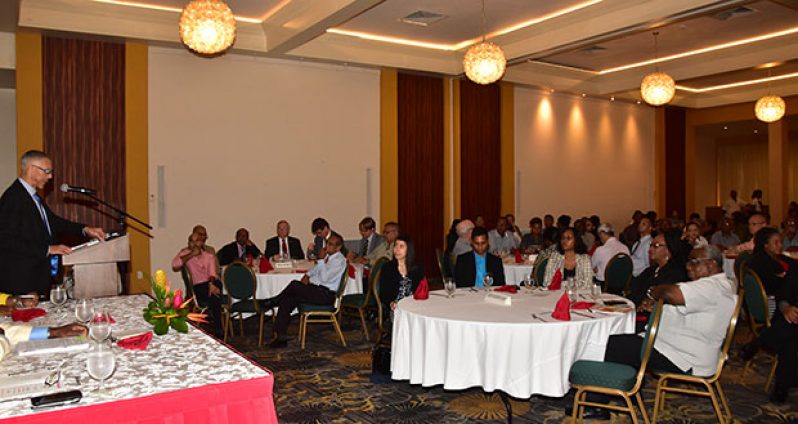By Svetlana Marshall
MINISTER of Business Dominic Gaskin has said that although Guyana is going through a difficult phase, the country is not in crisis, but Junior Vice- President of the Georgetown Chamber of Commerce, Nicolas Boyer, begged to differ, contending that there has been a 30-40 per cent drop in sales in businesses across the city. “…Guyana is not in crisis. Venezuela’s economy is in crisis,

Brazil’s is in trouble with negative growth for the second consecutive year and no clear end in sight. Trinidad and Tobago is projecting negative growth of 2 per cent yet again. Barbados is unlikely to grow by more than one half of a percentage point this year, following a 0.3 per cent growth in 2014 and 0.8 per cent in 2015,” Minister Gaskin said as he addressed the Guyana Manufacturing and Services Association’s (GMSA’s) Business Luncheon on Thursday at the Pegasus Hotel.
He said while Suriname’s economy grew by 1.8 per cent in 2014 and 0.2 per cent in 2015, Guyana’s economy grew by 3 per cent last year. This year, it is projected to grow by 4 per cent. “I repeat, we are not the ones with an economic crisis on our hands,” the Business Minister emphasised.
In response to the minister’s position on the state of the country’s economy, Junior Vice-President of the Georgetown Chamber of Commerce and Industry (GCCI) Nicholas Boyer, pointed out that businesses under the umbrella of the chamber are experiencing a 30-40 per cent decline in sales. It was on this note, the he pressed the Business Minister for answers regarding measures to be implemented to cushion the impact of falling commodity prices and the shortage of employment. Another participant proposed that short-term plans be implemented. But Minister Gaskin stood firmly on his position.
According to him, a financial crisis calls for short-term decisions which are often taken at the expense of long-term plans. Notwithstanding the many challenges, the Business Minister said the Government and the private sector have an opportunity to work towards a long-term vision for the country which should not be “squandered” because of the illusion that there is an economic crisis.
“A green economy, powered by affordable and renewable energy, driven by foreign earnings derived from exports of a range of value-added goods and services is well within our means to achieve. So too is the sustainable growth of this economy and the sustainable exploitation of our natural resources so that generations of Guyanese to come can enjoy our rich patrimony…,” he posited.
In keeping with the 2030 Agenda for Sustainable Development, which includes a menu of goals to end poverty, inequality and injustice, the A Partnership for National Unity + Alliance for Change (APNU+AFC) Government intends to prioritise the development and improvement of infrastructure in the areas of transportation, energy, information and communication technology and sea defence.
This, Minister Gaskin said, will pave the way for Guyana to become a model for sustainable economic development. “This is a model that our Government is asking you to believe in and to invest in because the private sector is an important stakeholder in Guyana’s economy without which there can be no development.”

He made it clear, however, that the Government is not turning a blind eye to the Doing Business Report which includes the Paying of Taxes, Trading Across Borders and Getting Electricity Indicators. In light of the issues raised in the Doing Business Report, the Business Ministry has initiated a programme that will tackle the indicators. This programme is being done with technical assistance from the World Bank.
“We’ve just had a legal and ICT consultants engaged to identify respectively, the legislative requirements and amendments under which we can better regulate and protect our businesses, and the ICT deficiencies that need to be corrected in order for government to provide better services for businesses.”
Additionally, at least two countries have offered technical assistance with the aim of addressing some of the remaining Doing Business reforms. It was explained that the Minister is also working to develop an electronic trade facilitation system that will completely change the way the country processes import and export licences, permits and transactions.
When compared to the Doing Business Report, Minister Gaskin said the Global Competitiveness Report is similarly comprehensive but focuses on boarder issues. “It examines Institutions, Infrastructure, Macroeconomic Environment and Health and Primary Education as basic requirements for economics at Guyana’s stage of development. It also looks at areas such as Labour Markey Efficiency, Financial Markets Development and Technological Readiness in the context of enhancing efficiencies of economies and ultimately Business Sophistication and Innovation as key factors for economies that are driven by innovation,” Minister Gaskin explained.
The country’s competitiveness, he reiterated, must be addressed through appropriate public-private dialogue. Currently, a model for this level of dialogue is being developed, and according to the Business Minister will be proposed shortly, however, he underscored the importance of having greater private sector participation in the development of long-term projects in the form of public-private partnerships.
GMSA President Eon Caesar, in his address, said “for far too long, Guyana has been stuck in this mode of primary production and export of primary products – rice, sugar, fruits and vegetables, meat and coconut water.”
He said it time for a paradigm shift. “We have to believe that the Government is prepared to challenge the status quo and broaden the availability of skills for the entire industrial sector. We have to witness the start of the outreach programmes that are badly needed, for example, to show the growers of lemons in the Mahaica Creek the best ways to get their produce to city markets, or to importing countries like Aruba and Dominica.”
Additionally, he advocated for the level of creativity displayed during the country’s Jubilee Celebrations be sustained for the good of the country.



.jpg)








